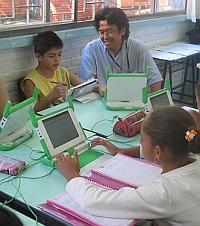Why should we be concerned about the XO and crime? Probably because the extent and pervasiveness of crime in the developing world is something not always understood from outside.
I am Eduardo Villanueva Mansilla and Lima, Peru, my home town, is not precisely the crime capital of the world; there are worst places around, like San Salvador or Rio de Janeiro; even Caracas has significant problems. Problem is the penetration of criminal activities into everyday life.
You see, from time to time, DSL services stops in the well-off neighbourhoods where it's relatively common. The usual reason? Cables are stolen. Even fiber-optics cables, though they are worthless, unlike copper ones that can be re-used. To steal a bunch of copper wires, robbers are willing to grab all the cables around. The actual benefit is very small, a couple of USD for 100 meters of cable. But the service disruptions occur anyway.
Everybody knows where the cables are stolen, where the cables are available, and how little they are worth. From time to time, a robber gets caught, and released by noon because the monetary value of the stolen goods is too small to merit prosecution. So he returns to the same and steals cables, again and again, all around town, shutting down DSL services, phone services, whatever.
Something similar happens all the time, of course at different intensities and for different goods, in most of the developing world. In many cases, violence is part of the equation; but it is not necessary for it to occur for crime to be so annoying: it's the uselessness of the petty criminality that drives everybody crazy.
Crime is a mixture of vandalism and actual stealing of anything that can be re-sold, eventually to the original owners, like the many times somebody gets his car's windshield stolen just to see it next day at the flea market where all the stolen goods are sold, and paying to recover it since there are no alternatives besides a extremely expensive original one.
This points towards the actual problem. It is not just crime, is the complete absence of any mechanism to make crime worthless. If the flea market was raided and all stolen goods recovered, there will be no actual incentive to steal wires or windshields or even cell phones.
Problem is, the flea market is just one of many, this particular one covers four or five city blocks, and a full ecology and economy lives off it. To raid it will mean to have an angry mob of a few thousand fighting the police. It is easier for everyone to just live and let live. The cost of doing business.
There are technical measures, like Bitfrost, to avoid XO computers being stolen, or at least to locate them. For them to work, some kind of institutional mechanisms would have to be in place, allowing the actual inactivation of the machines, and the black market should be fought by law enforcement.
If one kid from a group of thirty gets her Children's Machine XO stolen, she shouldn't have to request a replacement nor buy it back from the black market: she should get help from the police to recover it. It won't happen. Not at the scale necessary for it to be the exception instead of the rule.
Even flooding the crime ridden areas with OLPC XOs will only mean that stealing them will become a shakedown instead of an actual "reselling". It is also possible that at least some teachers will get their piece of the action, putting pressure on the students to get the X0 they need for they to pass to the next school year, or whatever.
Criminal gangs raiding small, rural towns for XOs to be sold a below-market prices (10 USD?) in big cities to compensate for the losses due to robberies. A lot of other awful scenarios.
Again, it is the nature of crime in our societies that make the situation difficult: the combination of institutional inability to confront crime, the large number of people involved in crime at many different levels, the common-place nature of stolen goods, the inevitability of XOs becoming "required material" for passing to one grade to another. Too many variables. Too many interests. Too little law enforcement capacities.
This is, obviously, an extreme scenario. But to disregard completely the significance of crime in developing nations while planning for the implementation of the XO may be a severe mistake.




In my work with telecenters/community tech. centers in public places, schools, libraries. and city offices, theft and vandalism has been a problem, sometimes so severe it has closed down an operation. The motives are not always to resell the stolen gear. Sometimes it has been about exclusion (from the center) or favoritism of one group over another.
Eduardo and I have talked about the centrality of mobile phones for all kinds of people in Peru and the subsequent loss of the phone as a result of a mugging.
A real problem exists for young kids who may live in a place with no doors, doors with no locks, no windows, and no real place to keep an XO safe. My wife is a school principal here in Silcon Valley, and even in a locked classroom with a burglar alarm she experiences several thefts a year. Imagine what it will be like in places like Nigeria or Brazil.
where are how can i buy one and what would it cost me
Here's a crazy idea: build a structure in a school with tiny entrances through which only kids can go. It would act as a storage room for the laptops. I guess it would only work if none of the children themselves are thieves, though. Plus, a locked adult-size door may be needed in case of emergency or in case a child goes in there to escape discipline.
The whole concept of the XO starts from "ownership" of the computers by kids. It wouldn't make any sense to lock the computers, if we were to follow the XO original concept.
Also, there's nothing to stop a dedicated thief to just tear down a wall, specially if there is a bounty of XO behind such wall. Sounds crazy? I've seen that happening. A couple of dynamite charges and there goes your wall.
XO laptops are creative and social tools. I wonder how often kids will leave them unattended.
The other thing, the XO laptops have a strong visual identity. If they are pervasive enough in a community, then any adult seen with one will almost certainly be identified as a thief, and not just any thief, but someone who steals from children.
Of course, there are plenty of child criminals.
Eas, I'm more worried about vandals than criminals, or rather criminals that are actually more vandals and don't care about anyone's opinion. Junkies, gangbangers, that kind of people, are ready and willing to steal from children even if there's only the pleasure of annoying the victim.
Eduardo,
My day by day experience with communities over the 3,500 meters altitude tell me that we agree: the original ownership proposal should be kept. The power of the administrators (who "owns" 50, 100 or 200 XO computers under their command) should be passed to the children. Empowerment? Sure.
By the way, we can relax because there is no possibility of any "criminal gangs raiding small, rural towns" because in these towns, with less than 100 families, ALL people know and they check WHO comes by the road, WHO leaves the town by the same and only road.
The problem is that the XO computers are not reaching these small towns, they are going to bigger villages (San Pedro is a poor neighborhood in a big city named Huancayo here in Peru). The forgotten 80,000 small towns, with 5 million people, will be kept away and distant from the XO and better education promise just because they are too far, too high, too isolated. And these remote villages are the most secure for the XOs. Are we doing something wrong? I think so. Let's fix it.
Best regards,
Javier Rodriguez
Lima, Peru